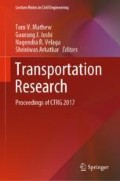Abstract
Passengers form the most important stake-holding body in public transit services. This study deals with the complexity of assessing transit service quality by identifying attributes affecting passenger’s satisfaction. An innovative questionnaire was designed by taking passengers’ demographic information and a wide spectrum of attributes related to operating conditions of two bus rapid transit systems (BRTS), i.e., Janmarg (Ahmedabad city) and Sitilink (Surat city) in the state of Gujarat. Total 23 variables are extracted using factor analysis with a Kaiser-Meyer-Olkin (KMO) value of 0.63 to conclude that the sample size is adequate enough for the model. These variables are grouped into six principal components and changed over to fuzzy sets with three membership functions each to map the fuzziness and ambiguity in passengers’ perception. The complications of generating 36 = 729 number of fuzzy rules are solved by introducing a hierarchical fuzzy inference system (FIS) with two lower-level FIS and one higher-level FIS. The first lower FIS consists of “accessibility,” “service provisions,” and “reliability” as fuzzy input variables to get “availability” as an output variable. The second lower FIS contains “safety and security,” “fare,” and “comfort” as input parameters to produce “comfort and convenience” as an output variable. The resulting fuzzy values are used in higher-level FIS and defuzzified to evaluate the satisfaction level of passengers by max-min composition technique. This method will help in improving existing transit facilities and devising strategies for ensuring sustainability.
Access this chapter
Tax calculation will be finalised at checkout
Purchases are for personal use only
References
Morfoulaki M, Tyrinopoulos Y, Aifadopoulou G (2007) Estimation of satisfied customers in public transport systems: a new methodological approach. J Transp Res Forum 46:63–72. https://doi.org/10.5399/osu/jtrf.46.1.981
Fu L, Xin Y (2007) A new performance index for evaluating transit quality of service. J Public Transp 10. https://doi.org/10.5038/2375-0901.10.3.4
Dowling R, Flannery A, Landis B, Petritsch T, Rouphail N, Ryus P (2008) Multimodal level of service for urban streets. Transp Res Rec J Transp Res Board 2071:1–7. https://doi.org/10.3141/2071-01
Tyrinopoulos Y, Antoniou C (2008) Public transit user satisfaction: variability and policy implications. Transp Policy 15(4):260–272. https://doi.org/10.1016/j.tranpol.2008.06.002
Eboli L, Mazzulla G (2009) A new customer satisfaction index for evaluating transit service quality. J Public Transp 12(3):21–37. https://doi.org/10.5038/2375-0901.12.3.2
Dell’Olio L, Ibeas A, Cecin P (2010) Modelling user perception of bus transit quality. Transp Policy 17(6):388–397. https://doi.org/10.1016/j.tranpol.2010.04.006
Awasthi A, Chauhan SS, Omrani H, Panahi A (2011) A hybrid approach based on SERVQUAL and fuzzy TOPSIS for evaluating transportation service quality. Comput Ind Eng 61(3):637–646. https://doi.org/10.1016/j.cie.2011.04.019
Khurshid R, Naeem H, Ejaz S, Mukhtar F, Batool T (2012) Service quality and customer satisfaction in public transport sector of Pakistan: an empirical study. Int J Econ Manage Sci 1:24–30
Mohamed M, Hine J (2013) Measuring the influence of the perceived bus transit quality on the perceptions of users. In: 13th world conference on transport research, Rio. https://doi.org/10.1080/03081060.2016.1142224
Noor H, Nasrudin N, Foo J (2014) Determinants of customer satisfaction of service quality: city bus service in Kota Kinabalu, Malaysia. Procedia Social Behav Sci 153:595–605. https://doi.org/10.1016/j.sbspro.2014.10.092
Pavlína P (2015) The factors influencing satisfaction with public city transport: a structural equation modelling approach. J Compet 7(4):18–32
Author information
Authors and Affiliations
Corresponding author
Editor information
Editors and Affiliations
Rights and permissions
Copyright information
© 2020 Springer Nature Singapore Pte Ltd.
About this paper
Cite this paper
Jena, S., Dholawala, H., Panda, M., Bhuyan, P.K. (2020). Assessment of Induced Fuzziness in Passenger’s Perspective of Transit Service Quality: A Sustainable Approach for Indian Transit Scenario. In: Mathew, T., Joshi, G., Velaga, N., Arkatkar, S. (eds) Transportation Research . Lecture Notes in Civil Engineering, vol 45. Springer, Singapore. https://doi.org/10.1007/978-981-32-9042-6_5
Download citation
DOI: https://doi.org/10.1007/978-981-32-9042-6_5
Published:
Publisher Name: Springer, Singapore
Print ISBN: 978-981-32-9041-9
Online ISBN: 978-981-32-9042-6
eBook Packages: EngineeringEngineering (R0)

